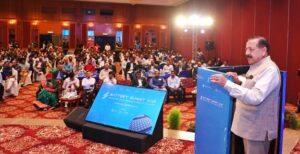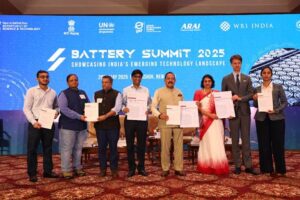Union Minister Dr. Jitendra Singh, addressing the Battery Summit 2025 in Delhi, emphasized that a strong innovation ecosystem and advancements in low-carbon technologies are vital for India to move from the world’s fourth-largest to third-largest economy. He reiterated that these developments will also be crucial for achieving India’s Net Zero target by 2070.
Speaking on the theme “Addressing Challenges, Driving Innovation and Scaling Solutions,” Dr. Singh pointed out that tapping into unexplored resources—such as the recently discovered lithium reserves in Jammu & Kashmir—along with innovation in clean energy sectors, can significantly reduce carbon emissions while boosting economic value.
A highlight of the summit was the announcement of the Battery Aadhaar Initiative, a digital tracking system for batteries launched by the Department of Science and Technology (DST). Calling it a “game changer,” Dr. Singh said the system will assign a unique digital identity to each battery pack, enhancing traceability, safety, recycling, and reducing counterfeit risks. This initiative will integrate with AI diagnostics and national EV databases to strengthen India’s battery intelligence ecosystem.
 Dr. Singh outlined several other key government-led efforts toward clean energy transition, including:
Dr. Singh outlined several other key government-led efforts toward clean energy transition, including:
-
PLI Schemes for Advanced Chemistry Cells
-
FAME and PM-eDrive Schemes promoting electric mobility
-
MAHA-EV Mission under the Anusandhan National Research Foundation (ANRF)
He also acknowledged the pivotal role of India’s flagship initiatives like Mission LiFE, the International Solar Alliance (ISA), and the Net Zero 2070 roadmap in transforming India’s global climate leadership image—from a reluctant participant to a proactive leader in sustainability.
Showcasing India’s innovation leap, the Minister noted India’s jump in the Global Innovation Index—from rank 81 to 39—and the explosive growth of its startup ecosystem, now the third largest globally with over 1.7 lakh startups. He highlighted the tenfold budget increase for DST, growing from ₹2,777 crore in 2014 to ₹28,509 crore in 2025, as a testament to the government’s commitment to research and development.
Looking ahead, Dr. Singh stressed three national priorities to sustain India’s clean energy and innovation momentum:
-
Technology Indigenization for self-reliance
-
Strengthening Domestic Manufacturing for resilient supply chains
-
Building a Strong Innovation Ecosystem through collaboration among industry, academia, and government
He praised WRI India for its leadership in sustainable practices through the Battery360 Alliance and acknowledged the critical support of UNEP, NITI Aayog, and the Global Environment Facility (GEF).
The summit brought together leading voices from the science and sustainability sectors, including Prof. Abhay Karandikar (DST), Mr. Asher Lessels (UNEP), Dr. Anita Gupta (CEST-DST), and Mr. Madhav Pai (WRI India), reinforcing the collaborative spirit needed to accelerate India’s clean energy future.
Powering a Greener Tomorrow: Indian Scientists Unveil Fast-Charging, Durable Sodium-Ion Battery
Powering a Greener Tomorrow: Indian Scientists Unveil Fast-Charging, Durable Sodium-Ion Battery



